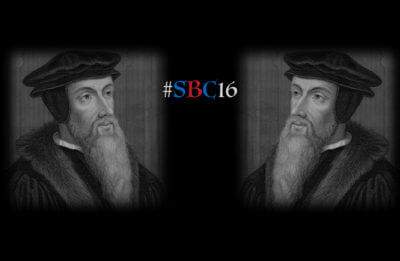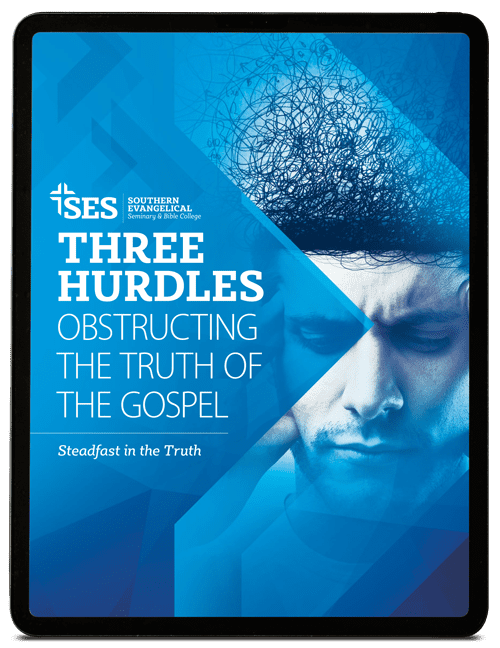A few weeks ago a Roman Catholic colleague who is a conservative political scientist and economist asked me a thoughtful and unexpected question. “Richard,” he said, “Why is it that such a high percentage of the Evangelical ‘Never Trumpers’ are Calvinists?”
I hadn’t thought about it exactly that way. After reflecting on the question, here is my attempt to provide an answer.
The succinct and simple answer is that their governing theology, which molds and shapes their world view (as any self-respecting theology should), has strongly predisposed them to their “Never Trump, both candidates are unacceptable, I will support neither” posture.
Not all “Never Trump” Evangelicals are Calvinists, but a large portion of them, probably a majority, including some of the most outspoken Christian leaders who arguing against Trump, are Calvinists. So why would being a 4- or 5-point Calvinist (see my explanation of the five points of Calvinism below) predispose someone to be a “Never Trumper?”
If you believe, as many Calvinists do, that everything has already been decreed and preordained by God, as opposed to other more, mediating theological traditions within Christendom, then it is certainly a more readily available option to believe that your decision not to choose a “lesser evil” over a “greater evil,” but to withdraw altogether and choose neither has itself, always been preordained.
Why? Well, you would be tempted to believe that your very decision to choose neither was not really your free decision, but had always been preordained by God. When you couple that with the belief that the decision about who is going to win, for example, the presidential election, has also always been preordained by God in eternity past, then it is tempting to say “it is out of our hands because God’s decreed will prevails.”
The temptation to determinism or fatalism is not inevitable or inherent in the Calvinist system, but it is certainly a more prevailing and accessible temptation than is the case in other Christian theological traditions.
If, however, you believe that your choices and actions are truly choices and actions that God has left you the discretion to make under His guidance and direction, and that those choices and actions do influence events positively or negatively, then you are perhaps less ready to so quickly decide not to choose the lesser evil in order to help keep the greater evil from prevailing, even for a finite period of time.
Of course, all orthodox historic Christian traditions believe that in the end God will prevail and culminate history in the victorious return of the resurrected and ascended Christ in triumph and glory.
When a decision gets really tough, albeit to the point of challenging your core beliefs about how to participate in democracy, it is extremely tempting to use a convenient doctrinal nuance to take the easy way out.
Theology, politics, and the nature of fallen man, are a lot more complex than that.
For a quick tutorial on Calvinism, keep reading.
A Quick Tutorial on Calvinism’s Five Points and Why I’m Only A “Three-and-a-quarter Pointer”
So what is this theology most popularly known as “Calvinism” or Reformed Theology? This extremely influential theology has been, and remains, a powerful force in Protestant theology and western Christianity in general. A very similar theology was espoused by the great early church theologian St. Augustine (354 AD-430 AD).
In the Reformation Era and beyond this theology has been inextricably identified with John Calvin (1509 AD-1564 AD), thus the label Calvinism, and has exercised great influence in the English speaking world through the conduit of the British and American Puritan Movement. The Pilgrim and Puritan fathers were Calvinists.
The shorthand summary of this extremely influential theology is expressed in the acrostic T.U.L.I.P. (T = Total Depravity, U=Unconditional Election, L=Limited Atonement, I=Irresistible Grace, and P=Perseverance of the Saints).
Calvin’s theology, embodied in his Institutes, was synthesized and systematized in the Synod of Dort (or Dordrecht) in 1618-1619 and in the Westminster Confession of Faith in 1646.
The over-arching theological truth driving the Calvinist world-view is the complete and utter sovereignty of God. The so-called five-points are derived from the dominant theme of God’s sovereignty and control. In Calvinism God decrees before the foundation of the world to save some men (unconditional election) and not to save others and Jesus’ death on the cross only applies to the elect (limited atonement). Those who are the elect are the objects of irresistible grace, because fallen man who is totally depraved must be the object of an irresistible call or Jesus’ sacrifice on the cross would be in vain and no one would be saved. The elect, having been the object of an irresistible call, will persevere to the end and thus they cannot lose their salvation. (Baptists call this “eternal security.”)
The Calvinists understanding of God’s sovereignty is that everything that has happened, is happening, or ever will happen has already been pre-determined (as a result of His omnipotence), not merely foreknown as a function of His omniscience.
If you have been around many seminarians you have probably heard some version of this joke: “Did you hear about the Calvinist who fell down three flights of stairs? He picked himself up and said ‘man, I am glad that is over!'”
The point is, nothing can happen other than what God has foreordained to happen.
This is an oversimplification of an impressively thought out, extraordinarily well-articulated Christian theological tradition. However, to summarize is to generalize and to categorize is to simplify — so be it!
It should also be said that for Calvin himself the over-arching, controlling vision was the total and utter sovereignty of God and the 5 points flowed from, and were derivatives of, that primary vision and truth.
In the interest of full disclosure I am not a Calvinist of either the 4- or 5-point variety (the contested point being “limited atonement,” did Jesus die on the cross only for the elect or potentially for everyone?). I have always felt that the difference between a 4-pointer and a 5-pointer is a distinction without a difference, because you are still left with a humanity divided between those who must believe in Jesus (the elect) and those can’t believe in Jesus (the non-elect).
Again, in the interest of full disclosure, I am a 3 ¼ point Calvinist if you evaluate my theology utilizing the template of 5 point Calvinism. I believe in about ¾ of T (Total Depravity), ¾ of U (Unconditional Election), and ¾ of I (Irresistible Grace), none of L (Limited Atonement) and all of P (Perseverance of the Saints). See my “Another View of the Biblical Doctrine of Election,” Christian Post , Jan. 14, 2014 for a brief summary of my 3 ¼ point model.
Unlike the 4- and 5-point Calvinists, I can say not only that salvation is by faith alone in Christ alone, I can say honestly with deep conviction to everyone I meet, “God loves you and He has a wonderful plan for your life. And, if you accept Jesus as your Lord and Savior then you can discover who you really are, and why God made you the unique, never to be duplicated human being that each of us is.”








